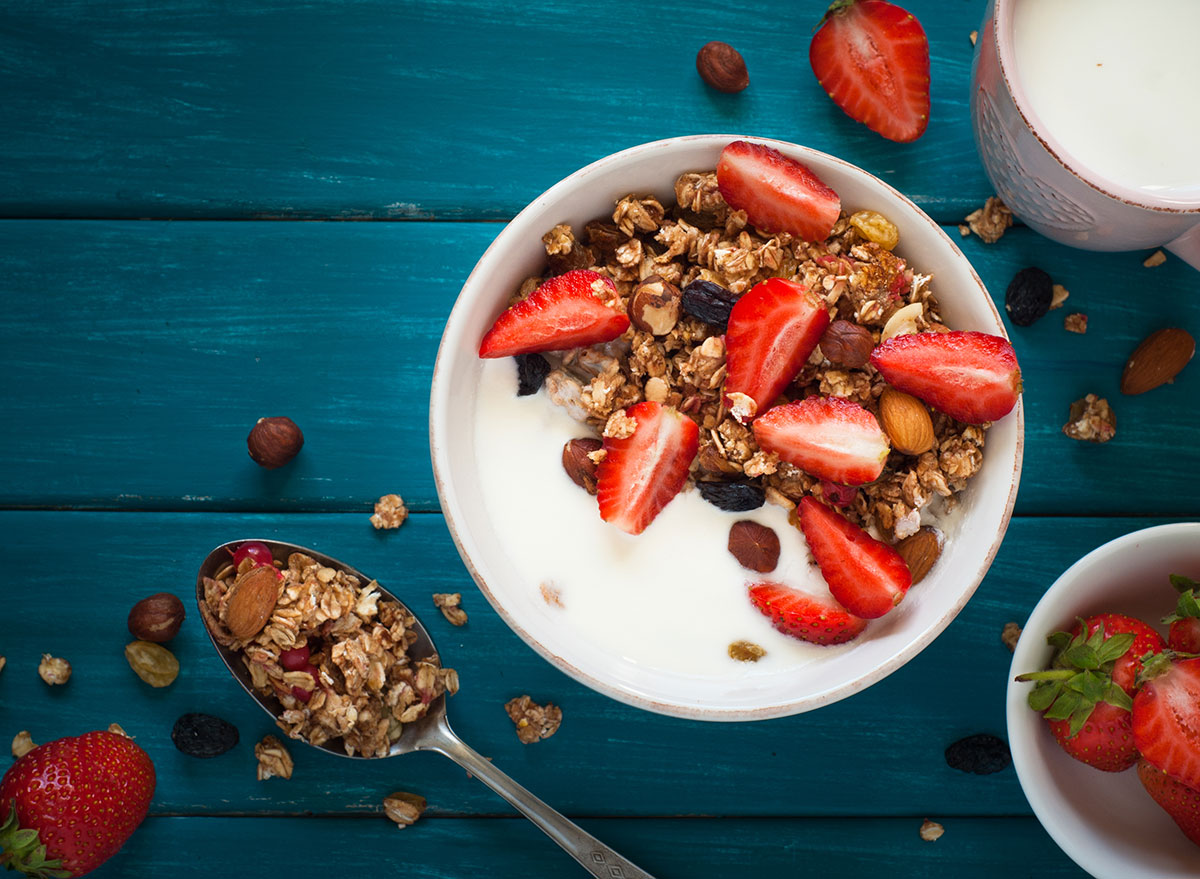Side Effects of Giving up Yogurt, According to Science
Whether you're taking the plunge into veganism, or trying to figure out if some of the reported health benefits of yogurt are actually true, people have a variety of reasons for giving up yogurt. This popular dairy product is made through the bacterial fermentation of milk and can be made with a variety of flavors and toppings. It's an easy, healthy breakfast or snack option for some, but for others, it can be affecting their bodies in negative ways.
While there are some benefits to giving up yogurt—especially for those who are lactose-intolerant—there are perks attached to continuing to eat the delicious dairy product. It's good for your health, and you might just run into a future royal while at a yogurt shop. By giving up yogurt, you could be missing out on some of the beneficial nutrients that come with enjoying a bowl of yogurt regularly.
Here's what you need to know about giving up yogurt, and for even more healthy eating tips, be sure to read up on our list of The 7 Healthiest Foods to Eat Right Now.
It can reduce inflammation.

A 2009 study from Future Medicine suggests that as people age, they more frequently suffer from lactose intolerance, which means their bodies are ill-equipped to digest lactose—the main carbohydrate found in dairy products. Lactose intolerance can lead to a host of symptoms, including inflammation.
Giving up yogurt can help to reduce inflammation, according to Heather Hanks, a nutritionist with Instapot Life.
"Many people do not realize that they are sensitive to dairy, and although yogurt is better tolerated because it contains probiotics, it can still be a source of inflammation if you are sensitive to cow's milk," Hanks says. "Additionally, many brands of yogurt contain added sugars, so giving up yogurt with cow's milk and added sugars could also help reduce inflammation in the gut, improving total body health."
Here are 9 Signs of Lactose Intolerance You Should Never Ignore.
You may be less regular.

It's well-known that yogurt helps you stay, well, regular. Yogurt is packed with probiotics, which are live microorganisms that are beneficial for digestive health. The food not only aids constipation in eaters, but it can also help prevent diarrhea, according to Harvard Health.
With all of the digestive help that comes with yogurt, it's safe to say that consumers might get a bit irregular once they give yogurt up. Hanks recommends finding probiotics in other food sources to help maintain regularity.
"If you have been using yogurt to help stay regular, then you may find that taking a probiotic supplement or getting your probiotics elsewhere, such as in sauerkraut, can help," Hanks says. Or turn to one of these 11 Probiotic Foods for Gut Health That Aren't Yogurt.
It can clear up acne.

Those who have a sensitivity to dairy products don't only have symptoms in their digestive systems. Dairy sensitivity can also be shown through acne outbreaks in those who consume dairy products. A study from the University of Copenhagen linked dairy consumption in people ages 7 to 30 and an increase in acne. So giving up yogurt, as well as other dairy products, might just lead to the end of acne problems for some.
"It doesn't work for everyone, but it's worth a try—simply lowering that dairy intake may just lead to clear skin," says Kathryn McDavid, CEO of Editor's Pick.
Here are 10 Foods Making Your Acne Even Worse.
You're reducing your calcium intake.

Calcium is one of the biggest benefits of consuming dairy products. The mineral is responsible for so many of the body's functions, including being a pretty big component of the makeup of our teeth and bones. So when you're cutting yogurt from your diet, make sure you have another source of calcium in there to take its place, because it's vital to maintaining health.
"By removing yogurt from the diet, one is potentially reducing their protein and calcium intake, both of which are essential for building and maintaining strong bones," says Christine Randazzo Kirschner, RD, nutritionist, and co-founder of Amenta Nutrition.
Calcium also has additional benefits that need to be considered when cutting yogurt from your diet, according to Kirschner.
"Calcium also helps blood clots, is essential for cardiac function, keeps nerves working properly, and may help reduce blood pressure," Kirschner says.
You could be more energetic.

We're all typically looking for a little more pep in our step once we hit the middle of the day, and instead of getting caffeine jitters from having your second, third, or fourth cup of coffee for the day, another way to get more a bit more energy is by cutting out your daily yogurt, according to Niyla Carson, a nutritionist at Fast Food Menu Prices.
"Yogurt contains amino acids, which basically makes us a bit lazy," Carson says. "So, if we cut off our daily dose of yogurt, our energy for the day might go up a bit."
In particular, Greek yogurt contains tryptophan, a type of amino acid that is found in many high-protein items like turkey, chicken, and eggs. Tryptophan helps to produce melatonin, a hormone that helps put you to sleep. This is also why some dietitians recommend enjoying yogurt as a sweet treat at the end of the day.
Along with yogurt, here are the 40 Best and Worst Foods to Eat Before Sleep.
You will be taking in less sugar, probably.

Did you know several store-brand yogurts contain more sugar than a Twinkie? If you find yourself reaching for yogurts with candy or sugary-flavored yogurts on the shelves, it's likely that giving up yogurt will help you decrease the sugar intake in your diet.
"Although healthy yogurt options don't have many additives, make sure to watch out for those with high sugar content, as it could do more harm than good," says Carson.
A study by the Poznan University of Life Sciences found that even in women who are not committed to a regular diet, cutting out some excess sugars can lead to a more healthy lifestyle.
It can be bad for your oral health.

There are a lot of benefits to eating yogurt, and one of the largest ones is that it contains a lot of calcium and a lot of protein, both of which are extremely important for maintaining proper dental health.
"Calcium works by maintaining bone density and protein strengthens your gums," says Max Harland, the CEO of Dentaly. "Plus, yogurt's high probiotic content promotes healthy bacteria in your mouth that eliminates issues like bad breath."
Harland also said that yogurt helps to balance the pH in mouths, which helps lead to fewer cavities.









